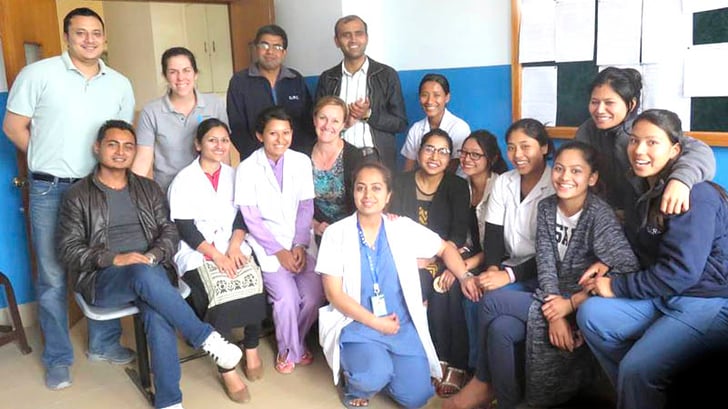Suffering a Spinal Cord Injury is a devastating and life-altering event for anyone, but in developing countries with limited healthcare systems, it’s even more fatal. We talked to Mandira Baniya, Nursing Supervisor at the Spinal Injury Rehabilitation Center in Nepal.
Mandira has performed a unique study on intermittent catheterization in Nepal. Among other remarkable findings, her study states that 96% of the participants reuse their disposable catheters, and that 73% don’t have accessible toilets.
Find out more about Mandira Baniya and her study in this blog post!

Spinal Cord Injury in developing countries
WHO states that as many as 500 000 people around the world suffer a spinal cord injury (SCI) each year. The risk of premature death is increased for these people, increasing in low- to middle-income countries. Only 5-15% of people in these countries have access to the products they need. It’s a cause of concern, and the situation desperately needs improvement and support.
Mandira Baniya is fully aware of the issues, having specialized in SCI healthcare, and is committed to spreading awareness about the importance of effective rehabilitation and treatment among healthcare professionals in Nepal.
– Preventable secondary complications such as pressure ulcers, urinary tract infection, and renal failure are leading causes of death following SCI in developing countries. As nurses, we have major roles in preventing such conditions and outcomes along with other healthcare professionals; not only in the healthcare institutions but also in the community. Unfortunately, a majority of the healthcare workers don’t know about the need for rehabilitation.
Intermittent Catheterization in Nepal
For people who have suffered a SCI, finding a working bladder and bowel routine plays a huge part in recovery. Mandira’s study 'Intermittent Catheterization Practice of people with Spinal Cord Injuries in Nepal', shows major gaps in this process and lays bare the areas in need of improvement.
– A general finding of the study was that far fewer people with SCI than expected were adherent with Intermittent Catheterization (IC). Training of IC was found to be delivered only in the rehabilitation center and it has to be initiated in general hospitals as well.
The study in numbers
- 96% of the participants reuse their catheters.
- 29.5% clean the catheters after use in running water, and 29.5% boil the catheters.
- 73% of the participants have inaccessible toilets.
- 72% of the participants admit that they have difficulties in getting new catheters and lubricants.
- Among those who have a job, 84.5% of the respondents often have difficulties in their vocational activities due to problems of bladder management.
- 78% of participants often need assistance for IC.
- 52% of the participants have symptoms of Urinary Tract Infection (UTI) 2-3 times a year.
- Only 14% always seek medical treatment if they have symptoms of UTI.
– The study concludes that life for a person with an SCI is fraught with very real and frequent risks to health due to lack of effective rehabilitation, knowledge and access to new catheters and lubricants.
How the study was funded
After attending the ASCoN conference in Bangladesh, Mandira was selected for a study grant issued by the International Network of SCI Nurses* and Wellspect HealthCare.
– It was my privilege to be selected for the grant in 2015 for my topic ‘Practice of Intermittent catheterization among people with spinal cord injury’. It was really motivating to receive this support as it helps to develop a guideline for intermittent catheterization (IC) practices, promoting IC practices and increase awareness about IC among health workers in Nepal.
Do you want to apply for Wellspect HealthCare supported research? Or now someone who should? You will find all the information you need here!
*SCI nurse.org
The International Network of SCI Nurses is affiliated with The International Spinal Cord Society (ISCoS). The aim is to link nurses globally, working in the specialty of spinal cord injury nursing. The vision is the enhancement of holistic care given to men, women, boys and girls, their careers and families, with spinal cord injury.




